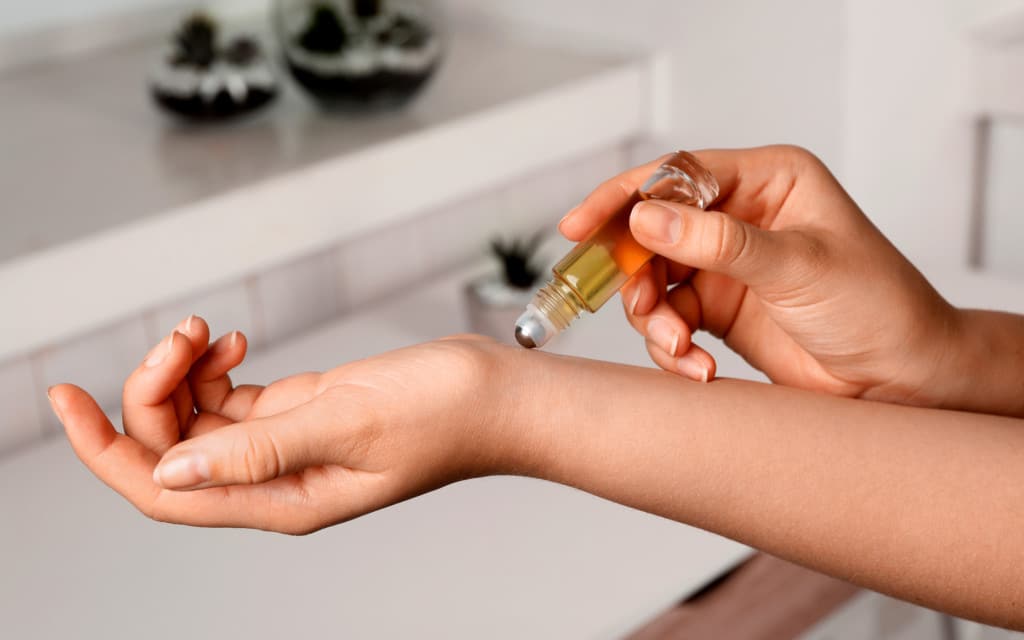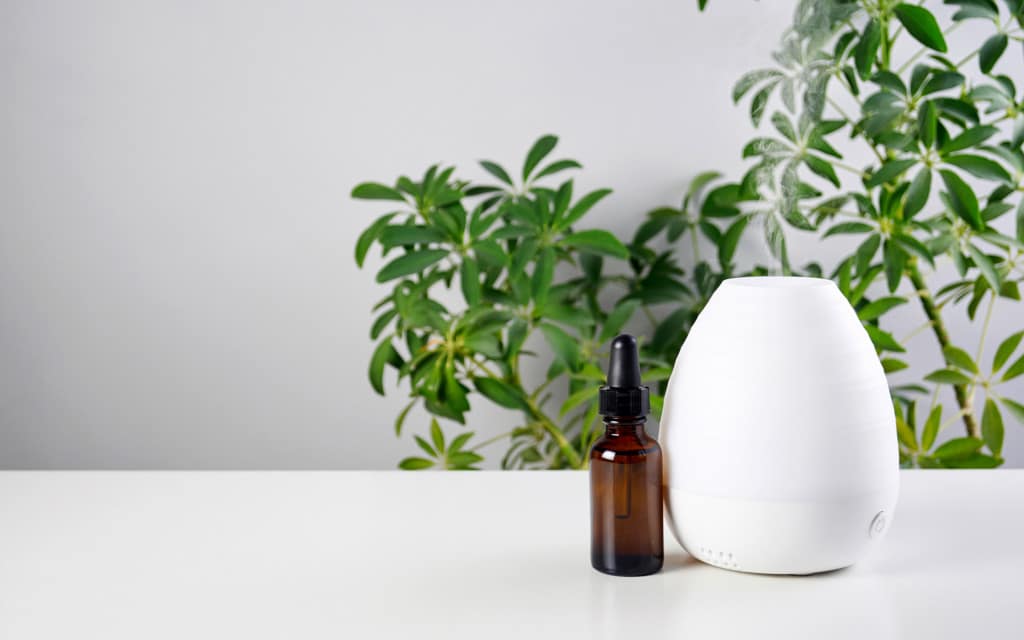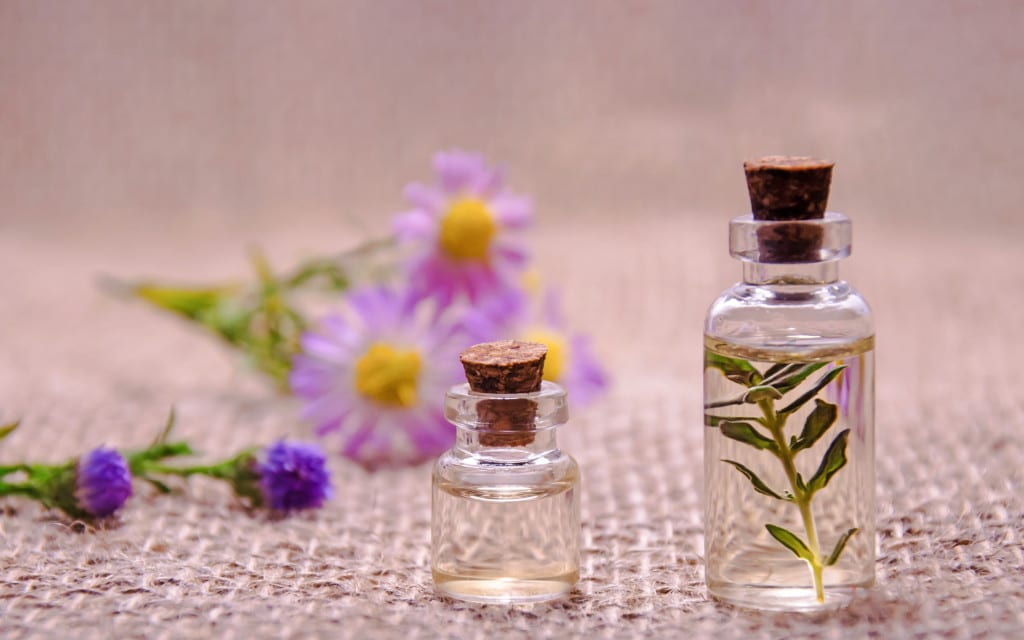So, how exactly are essential oils used for sleep?
Essential oils, the concentrated extracts taken from plants and herbs, can have many positive effects on our health and wellness. Aromatherapy studies indicate that the right scents delivered in the correct way can eliminate anxiety, reduce stress and improve concentration.
Used properly, essential oils can even help you sleep better.
Calming scents or diffused oils that support the opening of the airways create an environment likely to encourage deep, restful sleep. It’s much easier to turn to essential oils as a method of curing insomnia, than taking prescription or over-the-counter drugs.
Research into the impact of essential oils indicates that inhaling the right scents can be as effective relieving anxiety and insomnia as prescribed medications.
What is the best way to use essential oils, and how do you know that you’re picking the safest blends?
Read on to find out.

Where to apply essential oils for sleep
So, what is the best way to use essential oils on your body?
While there are a handful of great ways to use essential oils that promote sleep, the most common option is usually to apply them directly to the skin.
Essential oils are transdermal, so they can penetrate through the skin and start working on your body in various interesting ways. Some essential oils are best in their own clean form, others need a carrier oil.
Topical application is usually regarded to be one of the most effective usage methods for people with sleeping disorders. You can safely use essential oil on your feet as the skin on the soles of your feet is thick.
As well as under the feet, application of essential oils can be on writs, palms and temples. When applied topically, users get both the direct benefit that comes from the transdermal uptake, and simultaneously the advantages of inhaling the essential oil’s scent. Let’s make lavender oil an example.
The chemical components of lavender are excellent at entering the bloodstream, and is absorbed within five minutes of being massaged into the skin. And lavender oil smells fantastic too.
Typically, topical application will deliver the maximum concentration levels for your chosen essential oils, and the biggest benefits as a result.
What’s more, the substances don’t stay within your system for an excessive amount of time when applied, they often dissipate within 90 minutes.
There’s no one-size-fits-all strategy for where to rub essential oils for sleep. Usually, people apply these substances in a similar way to perfumes, on the wrists and around the neck.
However, as long as you stay away from sensitive areas, essential oils should be safe to apply anywhere.
Essential oils are very potent, which means you should only be using a few drops, often combined with a large amount of carrier oil. You can stick to around 12 drops of essential oil per ounce of carrier oil for a 2% dilution.
If you’re not sure where to apply essential oils for sleep, then you can also use these them in aromatherapy massages. Combine the relaxation of massage with the soothing scents of essential oils.
Other people also mix their favourite essential oils together into a carrier oil which they can use at night. Hence making their own essential oils recipe for sleep.
If you usually take a hot bath as part of your nighttime routine, adding a few drops of essential oil into your bath is an excellent way to soothe your senses before you drift off. Just be careful not to use oils that stain the bathtub.

Other ways to use sleep-inducing essential oils
Topical application is usually the most popular way of using essential oils for sleep. However, there are other methods available. Maybe you don’t like the idea of applying these substances straight to your skin.
For instance, a lot of the research into essential oils focuses on inhalation as an alternative to topical application of essential oils.
Before you start using any natural solutions for sleep, remember that everyone has a different kind of biochemistry. This means that what works for you might not work for other people, and vice versa.
It’s important to get to know your body and mind and find the solutions that are suitable for your needs.
If one kind of essential oil or application method doesn’t appear to have the right effect for you, then it might be a good idea to use an alternative.
Before we continue check out these great products on Amazon.
Here are some of the most common alternative options for essential oils used for sleep:
Diffusion
The easiest option for many people is to simply place a few drops of their preferred essential oils into a diffuser in their home. There are plenty of blends available to try, from lavender and clary sage, to chamomile, frankincense and ylang-ylang.
You can even experiment with making your own blends. Just follow the instructions provided by the manufacturer who made your diffuser.
Misting sprays
If a diffuser doesn’t work for you, but you would like to have the scent of your essential oil distributed throughout your room, then a misting spray is a good idea.
Using your own essential oil sleep recipe, create a mixture in a spray bottle with some water, and shake well. Mist your pillow a while before bed each night (give it enough time to dry). This way, you can inhale the soothing scents all night long.
There is some evidence that it may be possible to unlock the benefits of essential oils that promote sleep by ingesting them. However, it’s important to approach this method with a lot of caution.
Most essential oils aren’t designed to be consumed, and you will only be able to use certain options this way. It’s often best to approach ingestion with the help of a medical professional.
Usually, if you want to ingest helpful plant extracts, the easiest option will be to use supplemental tablets or capsules instead.
You could also consider looking into teas. There are many great sleep-inducing teas on the market that come with many of the best essential oils used for sleep infused into them, such as lavender and valerian.

Ensuring the safety of essential oils that promote sleep
Once you’ve decided how you’re going to use your sleep-inducing essential oils, it’s important to ensure you know how to purchase products that are safe for you and your loved ones.
Remember essential oils are highly potent substances taken from the stems, leaves, and flowers of plants. Although they are natural solutions, they aren’t as well-regulated in the current consumer world as other substances. This means that some essential oils can include dangerous chemicals.
Before you begin inhaling your essential oils or applying them topically, make sure that you keep the following things in mind:
Quality
One of the most important things to keep in mind when shopping for essential oils that promote sleep, is that the quality of these substances can vary drastically.
Just like other supplements such as melatonin, you’ll need to make sure you’re checking the ingredients. Look up the reputation of the company that makes the essential oil, and make sure that you’re only using the purest essential oils available.
Remember to check for synthetic oils and chemical isolates when you’re doing your research. These are substances that often damage the impact of your essential oil treatment.
Chemical composition
As mentioned above, an essential oil or blend can be made up of dozens of different chemical components. These components help to construct the aromatic and therapeutic profile of the oil.
However, there are some chemical components, both in the manmade and natural worlds, that can irritate the body and skin, and even cause potential drug interactions.
Before you begin using any essential oils, you should discuss your options with your doctor and make sure that your choice of oil is safe to use.
Method of application
Though the topical application of essential oils used for sleep gives you the highest concentration of benefits, aromatic usage is often the best option for those in search of minimal irritation. Choose your method of application based on what you know about your tolerance for irritation. Additionally, use caution and pay attention to any safety information printed on the label.
Dilution
Most of the time, the topical application of essential oils will require the use of a carrier oil to create a dilution of between 1% and 5%. As dilution percentages increase, the risk of irritation increases with them. With that in mind, choose your dilution levels carefully.
Skin integrity
Essential oils used topically should never be applied to inflamed, damaged, or potentially irritated skin. Make sure that you properly dilute your chosen essential oils before using them topically, and don’t apply them to sensitive spaces.
Age of user
Young children and infants are often more sensitive to essential oils than healthy adults. This means that essential oils should always be avoided for these sensitive groups. The elderly and people with certain medical conditions or sensitive skin will also need to use caution in this area.

The benefits of essential oils used for sleep
When it comes to finding a natural way to overcome sleep issues, essential oils is one of the most popular choices for most people. Unlike common benzodiazepines and sleep aids, there are practically no side effects when people are using essential oils for sleeping.
A majority of studies find that that there is a positive effect to using essential oils for sleep. Some people even find help in using essential oils for snoring.
Not only do essential oils not come with problems like addiction and reliance, but they can help to prevent addiction too. One study found that when people were introduced to lavender oil as a temporary relief option from continued medication achieved excellent outcomes.
When it comes to figuring out how to use essential oils for sleep, the key to success is remembering that different people will respond in different ways to this kind of treatment.
Experimenting with essential oils is a process that will take time and patience, so don’t expect to find the right solution the first time you try.
Want to find out more about natural treatments for sleep? Stay tuned to Siestio for high-quality solutions to all your sleeping issues.
Siestio. Sleep Matters.
General advice disclaimer
This article contains general tips and advice. However, no diet or exercise program should be started without consulting your physician or other industry professional first. For more information read our full disclaimer here.








